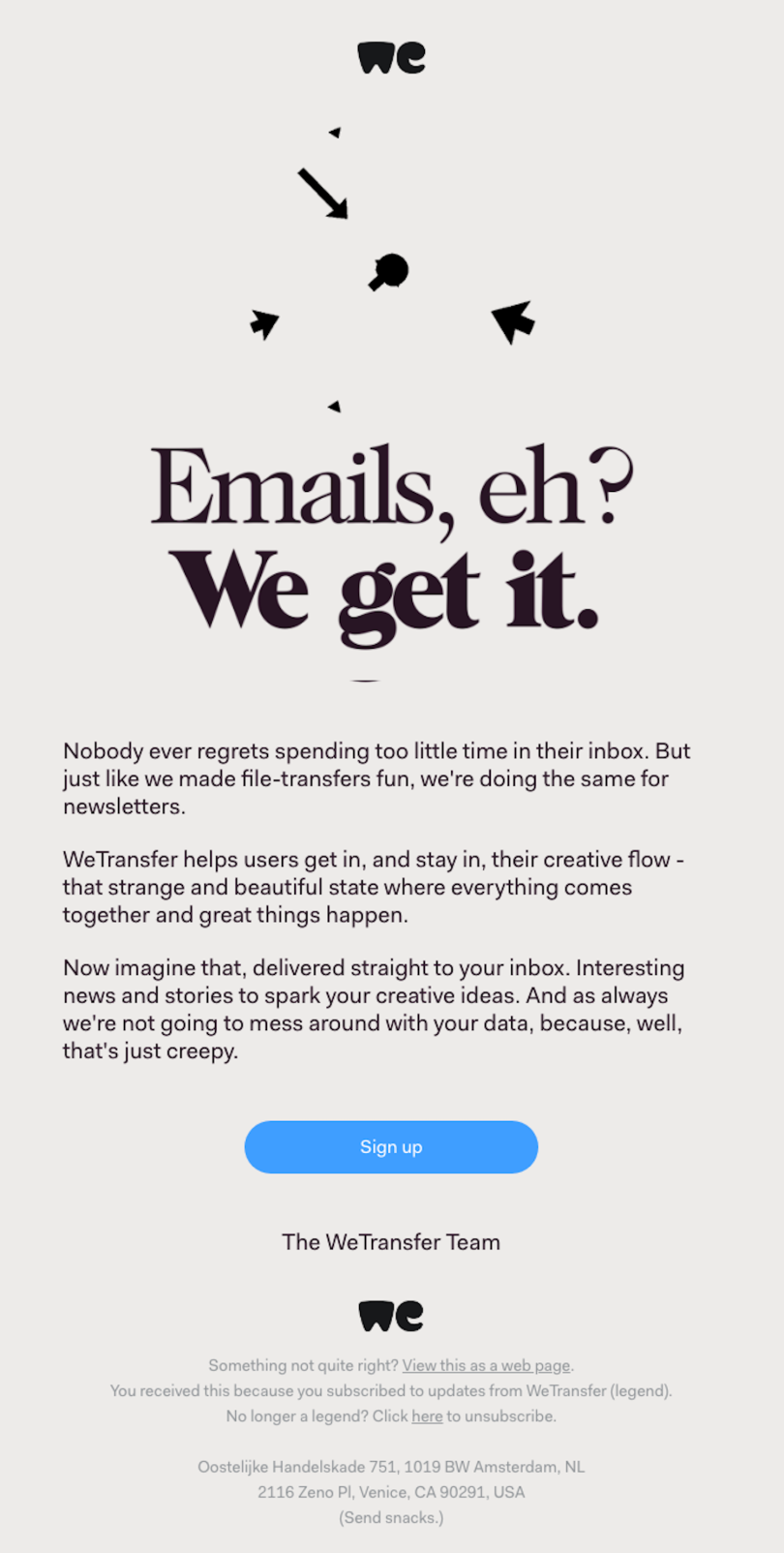In part one of this series, I broke down the flows that every brand needs, with a focus on e-commerce and technical products. In this piece, I want to take a look at services businesses and what types of emails you should consider and automate as your business scales. Many of the email types that I discussed in part one also apply here, but a services business should also consider a handful of additional emails.
The most significant difference between e-commerce and services businesses is that, in a services model, you will likely have fewer transactional interactions with your customers. For that reason, it’s vital to become an industry expert in all that you do, producing content on a regular basis that shows your expertise.
Weekly Newsletter
With fewer transactional messages to send, a weekly newsletter is a great way to stay engaged with your subscribers and remind them that you are a voice of authority. For example, if you are running a financial services business, your newsletter could be a few select articles each week that are relevant in the industry. Depending on the size of your business, you could be the one writing these articles, or you might find them from across the internet. Of course, remember when aggregating content from elsewhere that you need to cite the original source. Also, be sure to check with your own legal team about best practices to make sure that you’re sharing content in a legal and ethical way. Regardless of where it’s sourced from, a consistent newsletter filled with informative pieces is the best way to ensure that when your subscribers are ready to commit to services in your industry, they’ll choose you.

Services Offerings
The necessity of this type of email may seem obvious, but a lot of services businesses don’t explicitly explain their different offerings. Often, services businesses assume their offerings are very clear and any differences are obvious to potential customers. In reality, though, the services are often quite vague, especially if a potential client doesn’t have much knowledge about the field. For example, one management consultancy may work in a completely different way than another one does. To the outside world, though, they’re just another management consultancy. This email is an opportunity to explain what you’re best at and what you can achieve with and for your customers.

Post-Purchase Personalization
In a services business, your sales cycle will be longer and your transactions larger than a company just selling a widget. For that reason, personalization has a very different meaning for your business. After you close a deal, you’ll likely have some very personal interactions with the customers in the form of a kickoff call, weekly check-ins, or even an in-person meeting when necessary. Send an email to give the customer a preview of what’s to come, whether it be an introductory phone call with an account manager or access to the product that you offer to accompany your services.
Customer Testimonials
Most B2B businesses list their customers on their website for one simple reason — it’s a great acquisition tool! The customer testimonials email is no different. It highlights a customer that has had particular success using your services, so the email is a more subtle way to promote the benefits of using your company than a typical marketing email where it may feel like you are overselling yourself. Your goal here is to show a potential client how your services can apply to a company similar to theirs. Just be sure to include a clear call to action (CTA) on how to get in touch with you to receive the same kind of service that the featured customer did.

Surveys and Feedback Forms
In any business, gathering feedback is crucial to understanding your customers and with the ultimate goal of boosting the bottom line. In services businesses, the feedback loop can take a while. Often, your services will not reap immediate benefits, but rather improve the business over time. As a result, it’s important to send occasional surveys and feedback forms to your customers to understand how you’re doing and what you can improve on. Countless recommendations on surveys exist, but here is a particularly relevant one that thinks about email in specific.
Industry Insights Blogs
In addition to your regular emails, a services business will want to regularly write blog posts regarding insights in their industry. Of course, you want to include these posts in your emails, but they’re also vital for SEO and keeping your company top of mind for potential customers. They don’t all need to be long or packed with revolutionary insight. They just need to be well-researched and include some data to show off your expertise.

Automated vs. Manual
In a services business, it can be a bit more challenging to automate emails. Your business may not have a very advanced email system. As a result, writing manual emails feels easier, even though much less efficient. You also may have overly controlling executives who want to micromanage every communication with customers. Finally, you may feel that you can’t achieve personal relationships with customers through the automation of some.
Although these are valid reasons to keep things manual, failing to address them will only hold your business back from scaling. Investing in technology, trusting it to outperform humans, and cultivating relationships after your automated emails have lured them in is the most effective way to scale. Let email drive this for your company.
Summary
In a services business, personal relationships are the most vital aspect of your success. Automating some emails won’t replace the need to offer great services to your customers, but it will allow you to scale and nurture leads more effectively. Implementing the above emails will ensure a competitive advantage and lead you to better understand your customers.





